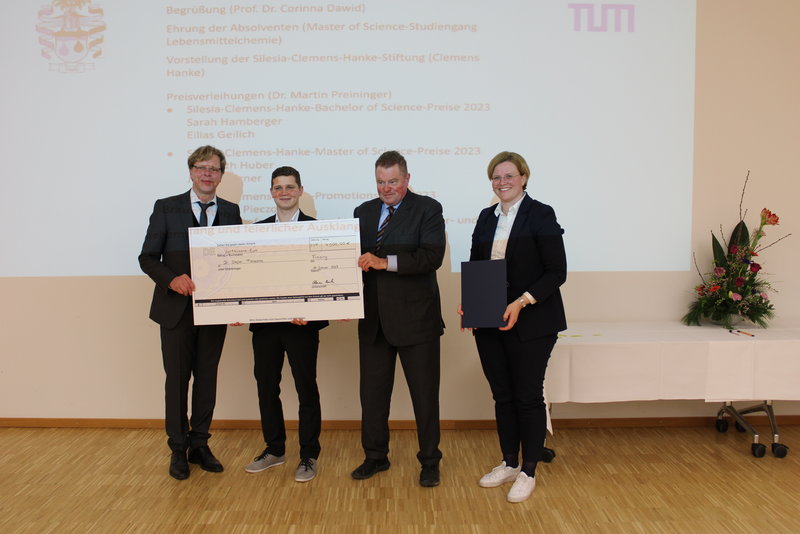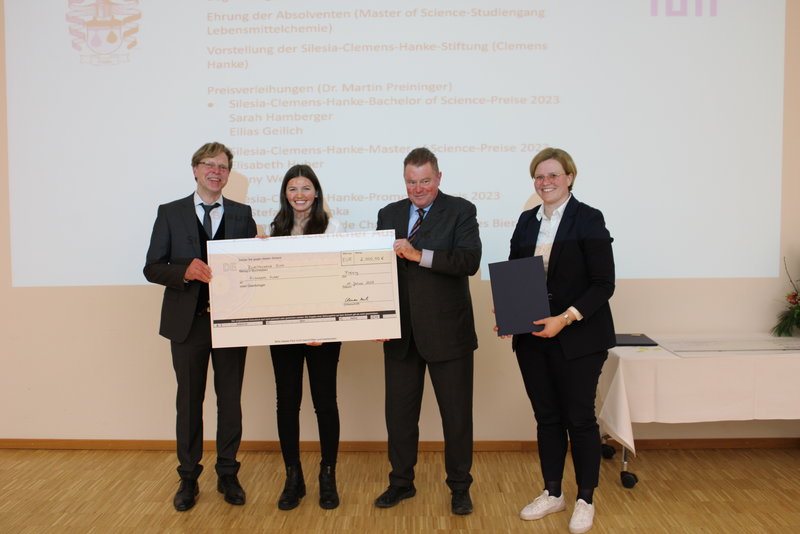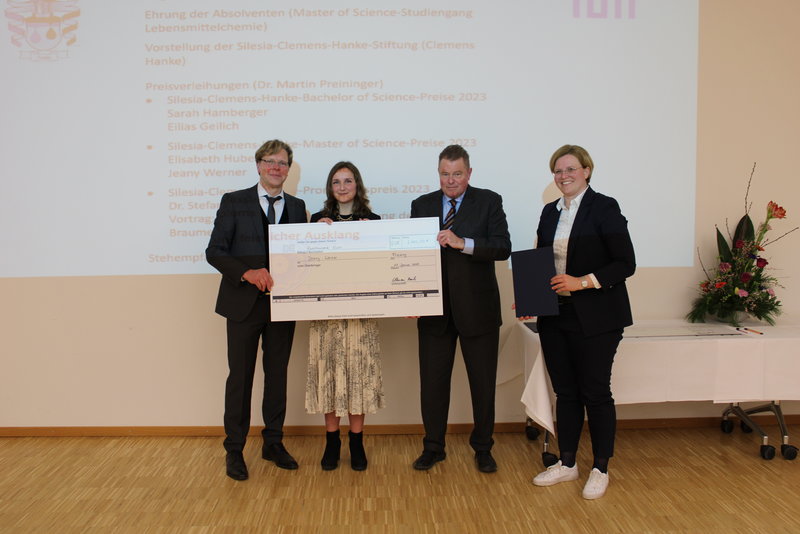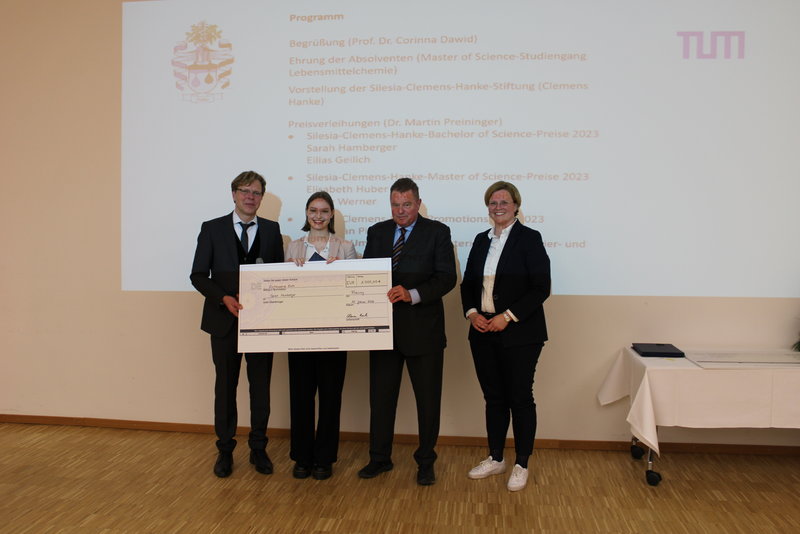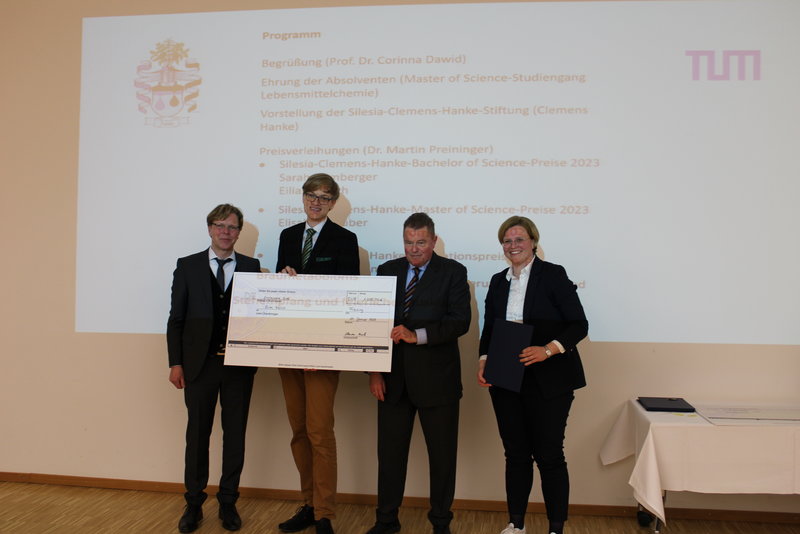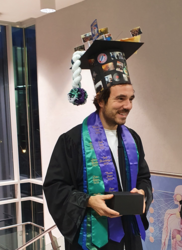News Releases - American Chemical Society
What makes those pandemic-era sourdoughs so deliciously, uniquely, sour?
16.08.2023, San Fransico
A few years ago, amid lockdown boredom, it seemed like everyone was perfecting their sourdoughs. A simple, fermented mixture of flour and water, the bread is powered by microbes that provide its one-of-a-kind tangy flavor. For over a hundred years, sourdough bread has been synonymous with San Francisco, where today, scientists will report that they’ve identified and quantified 21 key chemical compounds that make this bread taste and smell so unique. They’ve also compared the levels of the compounds in different breads.
Congratulations Magdalena Holzer for winning a poster price
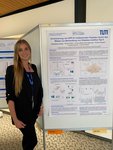
We congratulate Magdalena Holzer on winning the poster prize, at the 50th German Food Chemists' Day in Hamburg, Poster titled "Enrichment of DPP-IV-inhibiting peptides through malting for the treatment of type II diabetes mellitus".
Congratulations Prof. Corinna Dawid
We congratualte Prof. Corinna Dawid, who received her own Professorship at TUM, called „Functional Phytometabolomics“.
Dissertation of Veronika Walser

24.03.2023
Congratulations to Veronika Walser for defending her thesis on " Characterization of isocereulides, the isoforms of the emetic Bacillus cereus toxin cereulide" for earning her "Dr. rer nat." title.
Dissertation of Jana Weißer
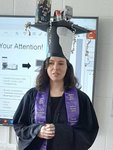
10.03.2023
We would like to congratulate Ms. Jana Weißer for succesfully defending her thesis titled "A contribution to the harmonization of microplastic analysis in beverages and food".
Congratulations Andrea Piller for winning a Poster Price.
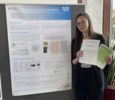
17.02.2023
Our team would like to congratulate Andrea Piller for winning a poster price for the project “The Proteomes that Feed the World”
Dissertation of Florian Utz

17.02.2023
Our team congratulates Mr. Florian Utz for successfully defending his PhD Thesis titled “Molecular-sensory studies on the flavor of fat-reduced milk model systems ”
Dissertation of Manon Janina Jünger

17.02.2023
Our team congratulates Ms. Manon Janina Jünger for successfully defending her PhD Thesis titled "Sensomics Analysis of Key Flavors and Flavor Modulators in Fermented Asian Foods"
Dissertation of Kyriaki Antoniadou
03.02.2023
Our team congratulates Mr. Kyriaki Antoniadou for successfully defending her PhD Thesis titled "Targeted Chemoprofiling and Bioactivity of Willow Bark"
Award Ceremony 2023 for the Silesia-Clemens Hanke Research Awards at the Technical University of Munich
01.01.2023
The Silesia-Clemens Hanke-Stiftung awarded the annual research awards for young scientists at the TUM School of Life Sciences Weihenstephan of the Technical University of Munich (TUM) on January 11, 2023.
Clemens Hanke established the Silesia-Clemens Hanke-Stiftung in 2015 upon the realization that the most sustainable investment in Germany’s future would be finding and supporting young talents in science. The foundation ensures the independent management of the global flavor producer Silesia, a family business founded in 1910 that employs over 900 experts. Since 1996, the successful entrepreneur Clemens Hanke has been CEO of the Silesia Group.
The foundation supports food chemistry graduates of the Bachelor of Science-, Master of Science- and doctoral program at TUM since 2017. One goal of the long-term cooperation for talented researchers is to honor young TUM scientists for excellent research results in food chemistry. The Silesia-Clemens Hanke-Stiftung and the Technical University of Munich congratulate this year’s laureates and wish them every success for their scientific future.
The Silesia-Clemens Hanke Dissertation Award 2023 is worth 4,000 Euro and honors Dr. Stefan Pieczonka for his excellent thesis “Comprehensive characterization of the beer and brewing metabolome” at the Chair of Analytical Food Chemistry of the Technical University of Munich.
The Silesia-Clemens Hanke Master of Science Awards 2023 with 2,000 Euro, respectively, are presented to:
- Elisabeth Huber for her Master of Science thesis “Isolation and Characterization of DPP-IV Inhibiting Peptides in Cereals“ at the Chair of Food Chemistry and Molecular Sensory Science of the Technical University of Munich.
- Jeany Werner for his Master of Science thesis “Studies on the cellular uptake of taste-active copper and lead salts “ at the Leibniz Institute for Food System Biology at the Technical University of Munich.
The Silesia-Clemens Hanke Bachelor of Science Awards 2023 with 1,000 Euro, respectively, are presented to:
- Sarah Hamberger for her Bachelor of Science thesis “Chemical-analytical detection of 4-hydroxy-5-methyl-2-methylene(2H)-furanone during strawberry fruit ripening” at at the Associate Professorship of Biotechnology of Natural Products at the Technical University of Munich.
- Elias Geilich for his Bachelor of Science thesis “Quantification of vitamin B6 and its glycosides in selected beer products and in different stages of the brewing process“ at the Chair of Analytical Food Chemistry of the Technical University of Munich.
Silesia-Clemens Hanke Research Awards 2023

Dissertation of Andreas Dunkel
21.12.2022
Congratulation to Mr. Andreas Dunkel for successfully defending his PhD thesis. He worked on "Chemical spaces of taste and odor" and granted the title Dr. rer. nat.

Dissertation of Michael Gigl
19.12.2022
Congratulation to Mr. Michael Gigl for successfully defending his PhD thesis. He worked on " Molecular sensory studies on the influence of high and low molecular weight constituents on aroma changes in coffee beverages" and granted the title Dr. rer. nat.
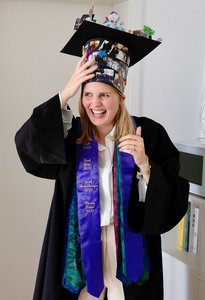
Dissertation of Verena Peters
08.07.22
Congratulation to Ms. Verena Peters for successfully defending her PhD thesis. She graduated on "Development of a high-throughput analysis for valuable flavourings in Mint" and was granted the title "Dr. rer. nat.".
Hans Joachim Boekstegers Förderpreis 2022 award winner!
We congratulate our colleague Luisa Murer for winning the Hans Joachim Boekstegers Förderprei 2022 award!

Dissertation of Sarah Brunschweiger
04.07.22
Congratulations to Ms. Sarah Brunschweiger for successfully defending her PhD thesis. Ms. Brunschweiger graduated on "Benchmark and strategy development of microbial fuel cells in industrial wastewater treatment" and was granted the title "Dr. rer. nat.".

Dissertation of Sinah Reiter
28 April 2022
Congratulation to Ms. Reiter for successfully defending her PhD thesis. Ms. Reiter graduated on "Quantitative analysis of bile acids in biological matrices using LC-ESI-MS/MS" and was granted the title "Dr. rer. nat.".
The Proteomes that Feed the World
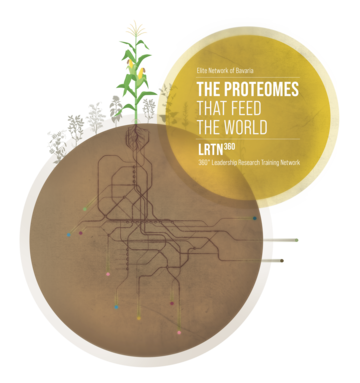
We are excited to be part of the Elite Network of Bavaria-funded graduate college “The Proteomes that Feed the World” at the School of Life Sciences, Technical University of Munich. The project offers an international doctoral program for researchers in Plant Proteomics, Bioinformatics and Biology. An exciting opportunity to join an interdisciplinary team of life scientists and bioinformaticians and be part of creating a crop proteome atlas from 100 important crop plants for human nutrition.
For more details about the projects please check the Youtube video (Link).
Dissertation of Matthias Edelmann
18 March 2022
Congratulation to Matthias Edelmann for his passed oral examination to his PhD thesis. He was granted the title "Dr. rer. nat." for the dissertation "Molecular Characterization and Quantification of Saponins from Sugar Beet (Beta vulgaris ssp. Vulgaris var. altissima).
Editorial in "ACS Agricultural Science & Technology"
Critical Reviews Should Illuminate a Path Toward Impactful and Fruitful Lines of Research
21 February 2022
Laura L. McConnell, Coralia Osorio Roa, and Thomas F. Hofmann
Imagine you are lost in a dark, dense forest with no guide to find your way through to safety. Luckily you find a small flashlight that allows you to see a path forward. With this flashlight, you can quickly find your way out instead of spending hours fumbling in the dark. An excellent review paper can serve as a flashlight for the scientific community to illuminate a path toward fruitful lines of research or to reveal research gaps in need of attention. Careful analysis of the literature may also reveal new more efficient pathways toward solving a difficult problem. Thus, a review paper can help scientists to focus on solving problems at the forefront of science while avoiding research that may lead to a dead end. In the writing of a review paper, it is especially important to spend a significant amount of time considering and crafting the conclusions and future recommendations in your Perspectives for Future Research section. This section is where the real impact of the review comes into focus, allowing you to shine a light toward the future and stimulate new research approaches.
A recent editorial by Skrabalak in Chemistry of Materials suggests that review articles should be original, timely, and authoritative and perhaps inspire new directions in a field. An editorial from many decades ago by Hart suggested that a “review will not only provide a summary of the state of affairs ..., but will also pinpoint the problems which still need attention and, ... will set (the reader) off in the “right” direction”. Some recent reviews from Journal of Agricultural and Food Chemistry, ACS Food Science & Technology, and ACS Agricultural Science & Technology are highlighted to provide examples of review papers that provide a clear path forward for readers.
Graduation Thomas Kauz
10 December 2021
Congratulations to Thomas Kauz for a successful oral exam on his PhD thesis. Thomas Kauz graduated on molecular-sensory studies on the taste quality of cocoa (Theobroma cacao L.), and earned the title "Dr. rer. nat.". All the best to your next steps, Thomas!
Spicy substance from pepper gets into breast milk after eating
Spicy breast milk?
25 November 2021
In part of a recent human study led by the Technical University of Munich (TUM), it was found that after eating a curry dish containing pepper, piperine - an alkaloid responsible for the pungency of pepper - was present in the milk of breastfeeding women. The findings help decipher mechanisms that shape our food preferences from infancy.
Breast milk is the first food that babies consume. Various studies have suggested that the “taste experience” in early childhood influences eating behavior in adults. Unlike standardized infant formula, natural milk does not taste and smell the same every day. The differences are largely due to the maternal diet.
Graduation Sara Marquart
18 November 2021
Congratulation to Sara Marquart for the successful oral examination of her PhD thesis. Sara Marquart graduated on stable isotope experiments and quantitative studies on the formation of unknown bitter compounds in roasted coffee, and earned the title "Dr. rer. nat.".
Article in DFG magazine "german research" 2/2021
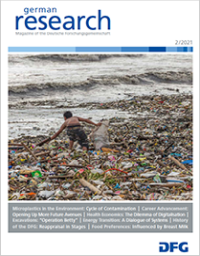
Influenced by Breast Milk
How do food preferences develop? An intervention study using curry as an example is dedicated to examining the transfer of flavour compounds into breast milk
A traditional German expression for something acquired very early in life is that it has been “absorbed with mother’s milk”. This figure of speech is worth reflecting upon, also in the literal sense and from the point of view of various scientific disciplines, which are seeking clarification based on hard biochemical facts and data. What else does a baby absorb with breast milk, apart from the vital macroand micronutrients it contains? It appears to be the case that many habits and skills have their origin in early childhood. Sensitive time frames in human development are well-known with regard to language acquisition, but similar phenomena can be observed regarding the acceptance of foods.
Graduation Silvija Abakuks
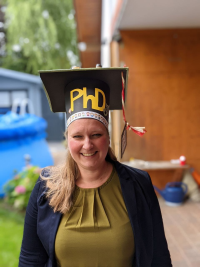
16 September 2021
Congratulation to Silvija Abakuks for her successful oral examination of her PhD thesis. She attained the title "Dr. rer. nat." with studies for the characterization of bitter and pungent tastants in native olive oil extra and investigations on the formation of oral lipid films on its consumption.
Winner of the Friedrich-Meuser-Forschungspreis 2021

Dr. Karin Sebald und Dr. Johannes Schäfer are awarded the renowned prize for their excellent dissertations within the Industrial Collective Research (IGF)
We congratulate our former colleague Dr. Karin Sebald and her research partner Dr. Johannes Schäfer for being awarded the Friedrich-Meuser-Forschungspreis 2021!
The yearly Friedrich‐Meuser‐Forschungspreis of the Forschungskreis der Ernährungsindustrie (FEI) honors the best dissertations within its projects of the Industrial Collective Research. For the first time, the prize is awarded twice this year: To Dr. Johannes Schäfer and Dr. Karin Sebald for their exceptional scientific achievements within their dissertations.
Both theses were based on a joint FEI project (AiF 18124 N) and both excelled beyond the other submitted proposals with scientific brilliance and their high portential for application and transfer. With this award, the jury emphasizes the added value of interdisciplinary projects in the area of food technology and food chemistry - an objective the FEI is committed to promote specifically.
Dr. Karin Sebald and Dr. Johannes Schäfer will present their works in a combined presentation at the virtual award ceremony on 9 September, 2021, at 11 a.m.: "Produktionsprozesse optimieren und Lebensmittelressourcen schonen dank IGF: Sauermolkefreies Herstellen von nicht-bitteren Frischkäse-Produkten aus konzentrierter Milch" will be the topic of the web presentation in German language. Dr. Götz Kröner, chairman of FEI, will give the laudatory speech. Please be welcome to participate free of charge, application is open at the FEI website.
Food technologist Johannes Schäfer finished his PhD thesis in 2019 and was mentored by Prof. Dr. Dr. Jörg Hinrichs, Director of the Department of Soft Matter Science and Dairy Technology and Director of Dairy for Research and Training at the University of Hohenheim. Food chemist Karin Sebald defended her PhD thesis successfully in 2020 at the Chair of Food Chemistry and Molecular Sensory Science and was mentored by Prof. Dr. Thomas Hofmann, now President of the Technical University of Munich.
The Friedrich-Meuser-Forschungspreis was awarded first in 2019 and was named after Prof. Dr. Dr. Friedrich Meuser. The long-time former chairman of the FEI Wissenschaftlicher Beirat contributed significantly to promoting the Industrial Collective Research (IGF) and supported young scientific talents in particular.
Graduation Alin Krauß
16 July 2021
Congratulation to Alin Krauß for her successful oral examination of her PhD thesis. Alin Krauß graduated on human sensory studies on the perception of key food aroma compounds and their recombination, and earned the title "Dr. rer. nat.".
Graduation Annika Schulz
18 June 2021
We congratulate Annika Schulz for the passed oral examination on her PhD thesis. She obtained the academic title "Dr. rer. nat." for her mass spectrometric studies on the influence of carious activity on the metabolome of human saliva and pellicle.
Graduation Peter Gläser
16 June 2021
We congratulate our former colleague Peter Glaeser for the passed oral examination on his PhD thesis. He obtained the academic title "Dr. rer. nat." for his research on the molecular-sensory characterization of bitter tastants in pea protein isolates (Pisum sativum L.).
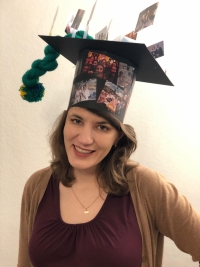
Graduation of Laura Brehm
January 29, 2021
We congratulate our former colleague Laura Brehm for the passed oral examination on her PhD thesis. She obtained the academic title "Dr. rer. nat." for her research on novel thiamine-derived taste enhancers in process flavors and model reaction systems.
Team SIDERION
3rd winner of the TUM IdeAward 2020
Congratulations to our colleague Christian von Heynitz and the team SIDERION for winning one of the TUM IdeAwards 2020!
The Technical University of Munich (TUM) and its Affiliated Institute UnternehmerTUM, Europe's biggest Center for Innovation and Business Creation, promote start-ups from science in an eco-system unique in Europe. A central element in this facilitation and support structure is the TUM IdeAward, which has been presented to the best start-up ideas at the university since 2012. TUM and UnternehmerTUM award the prize jointly with the Zeidler Research Foundation, which provides the cash prize amounting to a total of 37,500 euros.
At yesterday's online event, which was followed by more than 800 viewers in the livestream, ten teams presented their founding ideas - three of them received awards.
SIDERION
Solid-liquid reactions play a key role in all process industries, especially in the pharma and water treatment sector. Thereby, (bio) chemical or physical interactions between a liquid and a particulate solid phase take place by means of material transport. However, established procedures harbor procedural weaknesses limiting the transport rate and thus the techno-economic efficiency: process time, footprint, use of resources and waste generation are currently far too high. This is due to the limited usability of small solid particles, which, however, are desirable due to the higher interaction surfaces. SIDERION solves this problem with a highly efficient rotating bed reactor. The innovative essence is the use of a planetary gear to generate periodic centrifugal forces, which keep the particles in an oscillating motion and prevent clogging of the particle bed while maximizing the transport rate. Therefor the reactor chamber rotates around its own axis while moving on a circular path; like the earth does around the sun.
[Text in German] Mit mikrobiellen Brennstoffzellen energieautark Wasser reinigen
Wasser- und Energieeffizienz im Brauprozess
Sowohl theoretische als auch technische Lösungen können die Energie- und Ressourceneffizienz einzelner Prozessschritte oder komplexer Prozessketten im Brauprozess maximieren und Alternativen zu etablierten Verfahren bei gleichzeitiger Minimierung der Umweltbelastung bieten. Die Arbeitsgruppe „Wassertechnologie" (AGW) unter der Leitung von Dr. Karl Glas an der Technischen Universität München (TUM) beschäftigt sich mit der Schnittstelle von Wasser, Energie und Umwelt und ist dabei auf die Bedürfnisse der Getränke- und Lebensmittelindustrie spezialisiert. Die Forschenden möchten kleinen und mittleren Brauereien ermöglichen, ihr Abwasser mit mikrobiellen Brennstoffzellen energieautark zu reinigen. Die deutschlandweit erste Pilotanlage in der Brauerei- und Getränkeindustrie ging im Herbst 2019 in Betrieb.
Article in "Faszination Forschung" 24/20
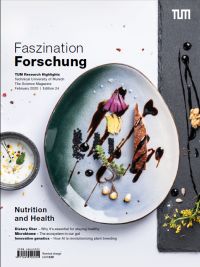
On the road to brewing self-sufficiency
Dr. Karl Glas and his working group are experts in water management in breweries and food producing companies. From designing the chemical and biological properties of water to solving complex purity issues, they are searching for the optimization potential inherent to these companies and their processing operations. Currently, their aim is to help small and medium-sized breweries to clean their wastewater self-sufficiently with the aid of microbial fuel cells. The fall of 2019 saw the first pilot system in the brewery and beverage industry in the whole of Germany go into operation at a major German brewery.
Contribution to "TUM Forum Sustainability: Wissenschaft, Vernunft, Nachhaltigkeit – Denkanstöße für die Zeit nach Corona" (in German only)
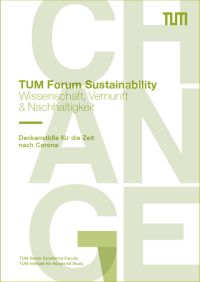
Der Lebensmittelsektor - Aufbruch in ein neues Jahrzehnt
Die aktuelle COVID-19-Pandemie hat eindrucksvoll vor Augen geführt, wie wichtig die Lebensmittelversorgung für das Gemeinwohl ist. Hemmungslose Hamsterkäufe machen deutlich, wie Krisensituationen unsere gerade in den Industrieländern als selbstverständlich empfundenen Grundbedürfnisse wieder in den Mittelpunkt rücken.
Link to "TUM Forum Sustainability" (in German only)
Article in the downloadable book (pdf, 4 MB, in German)
New method for quality control of chanterelle mushrooms
Chanterelle mushrooms as a taste enhancer
June 30, 2020
Chanterelles give savoury dishes a rich body and a unique complex flavor. Experts refer to this as the kokumi effect. A research team from the Technical University of Munich (TUM) and the Leibniz-Institute for Food Systems Biology recently developed the first method to clearly quantify chanterelle-specific key substances that contribute to this effect. This method can also be used for quality control.
Chanterelles (Cantharellus cibarius) are one of the most popular mushrooms in Germany. Depending on the weather, chanterelle season starts in early July. Connoisseurs value the mushroom’s delicate fruity aroma, which is reminiscent of apricots, and its aromatic and slightly bitter taste profile. Not only do chanterelles have a unique flavor profile, they also function as taste enhancers, lending dishes a well-rounded mouthfeel and a lingering, rich flavor.

Article in "Faszination Forschung" 24/20
The kaleidoscope of good taste
Some foods contain several dozen chemical substances which determine their taste. Separating them from each other and identifying them is a Sisyphean task to which the team working with food chemist Prof. Corinna Dawid has dedicated itself. The researchers work with a mixture of measuring equipment and human tongues.
Der Eintrag von Mikroplastik in Lebensmittel und die Aquatische Umwelt und seine Folgen – aktuelle Fragen und Antworten
Das Thema Mikroplastik erfährt große Aufmerksamkeit in der Bevölkerung, die nach Aufklärung zu den damit in Zusammenhang stehenden potenziellen Gefahren verlangt. Bedingt durch die komplexen und uneinheitlichen analytischen Nachweis- und Quantifizierungsverfahren fehlen jedoch bislang vergleichbare Daten zur Menge von Mikroplastik in der Umwelt oder in Lebensmitteln. Gleichzeitig ist eine fundierte Risikobewertung, aufgrund teils widersprüchlicher Ergebnisse, aktuell sehr schwierig. Beides steht im Fokus von „MiPAq“, einem Forschungsprojekt mit Industriebeteiligung an der Technischen Universität München.
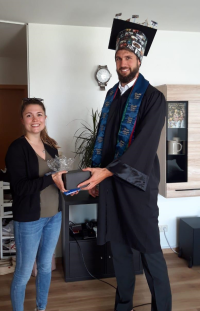
Graduation of Mathias Salger
May 28, 2020
We congratulate Mathias Salger for the passed oral examination on his PhD thesis. He obtained the academic title "Dr. rer. nat." for his results on taste-modulating peptides in over-fermented cocoa beans.
Welcome to our team!
May 1, 2020
We'd like to give a kind welcome to our most recent team member, Magdalena Holzer. She finished her studies in food chemistry as Master of Science at the Technical University of Munich, her master thesis showed a new possibility to quantitate phytohormones in model plants by means of LC-MS/MS. Magdalena Holzer is going to work on her PhD thesis at our chair. We are looking forward to having her in our research group and wish her a lot of success for all her experiments.
Graduation of Karin Sebald
March 6, 2020
We congratulate Karin Sebald for the passed oral examination on her PhD thesis. She obtained the academic title "Dr. rer. nat." for her works on new strategies for the characterization of the sensory relevant peptidome of fermented food.
Graduation of Richard Hammerl
February 21, 2020
We congratulate Richard Hammerl for the passed oral examination on his PhD thesis. He obtained the academic title "Dr. rer. nat." for his works on differential off-line LC-NMR coupling for the molecular mapping of nutrient-induced metabolome changes in Saccharomyces cerevisiae and Penicillium roqueforti. We especially congratulate on the honors of summa cum laude.
